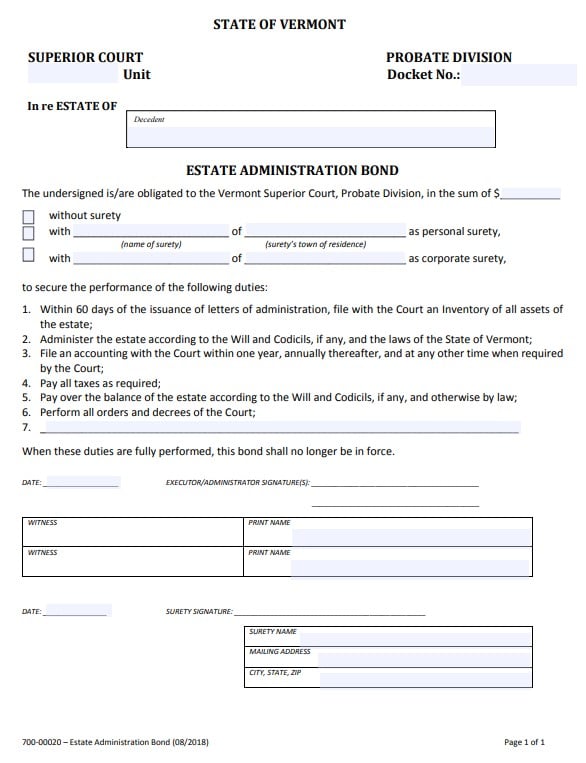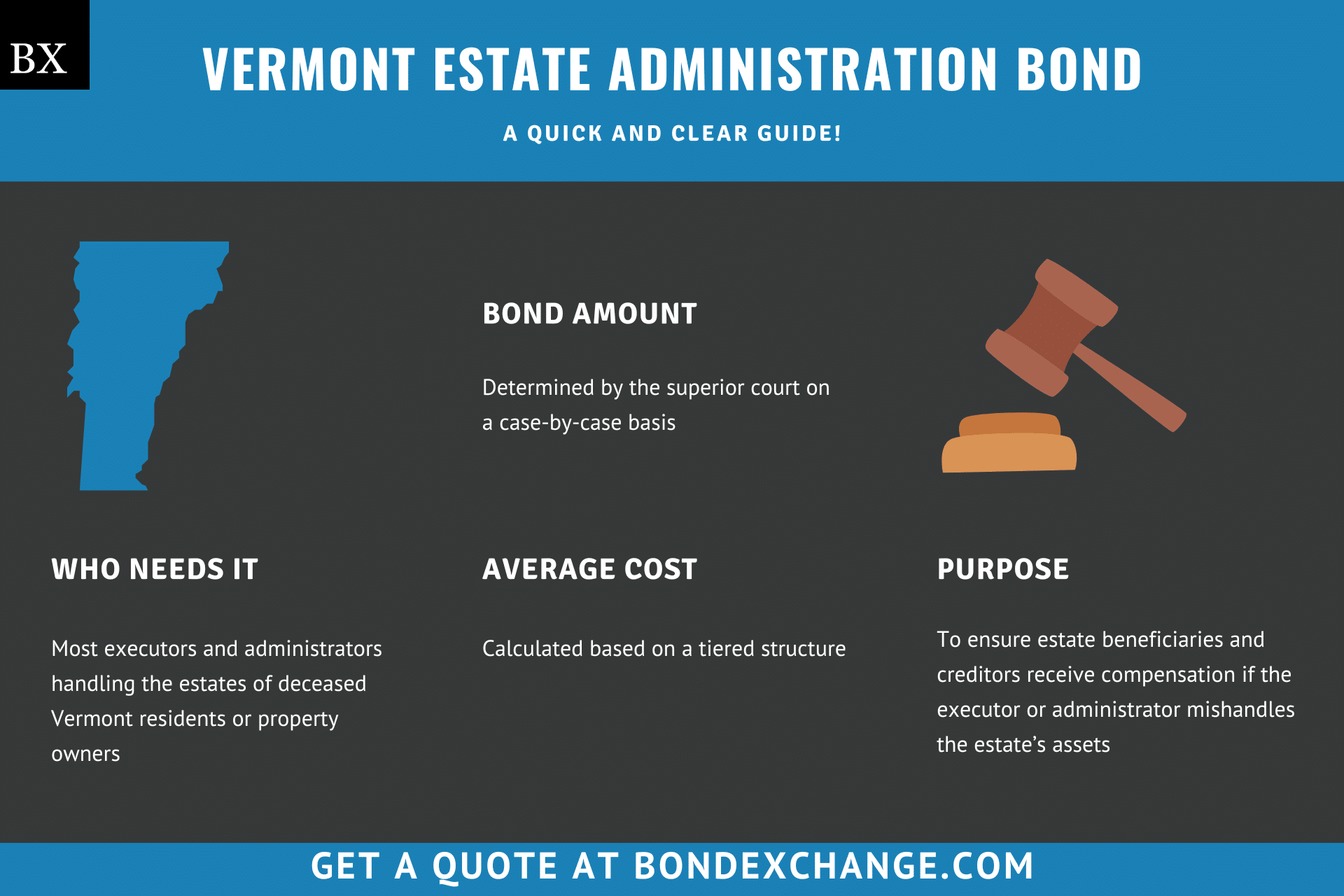Vermont Estate Administration Bond: A Comprehensive Guide
This guide provides information for insurance agents to help their customers obtain a Vermont Estate Administration bond.
At a Glance:
- Lowest Cost: Calculated based on a tiered structure
- Bond Amount: Determined on a case-by-case basis (more on this later)
- Who Needs it: Most executors and administrators handling the estates of deceased Vermont residents or property owners
- Purpose: To ensure estate beneficiaries and creditors receive compensation if the executor/administrator mishandles the estate’s assets
- Who Regulates Executors and Administrators in Vermont: The superior court of the county with jurisdiction over where the deceased individual resided or had property

Background
14 V.S.A Statute 902 et seq. requires all executors and administrators of an estate to be appointed by a court before assuming their fiduciary duties. The Vermont legislature enacted the appointment requirement to ensure that executors and administrators do not mismanage the estate’s assets. To provide financial security for the enforcement of this requirement, executors and administrators must purchase a probate surety bond to be eligible for appointment.
What is the Purpose of the Vermont Estate Administration Bond?
Vermont requires executors and administrators to purchase a surety bond as a prerequisite to being appointed as a fiduciary over an estate’s assets. The bond ensures that the estate’s beneficiaries and creditors will receive compensation for financial harm if the executor/administrator fails to abide by the regulations outlined in 14 V.S.A Statute 906. Specifically, the bond protects beneficiaries and creditors if the executor/administrator fails to adhere to all court orders or mismanages the estate’s assets. In short, the bond is a type of insurance that protects the estate’s beneficiaries and creditors if the executive/administrator violates their fiduciary duties.
How Can an Insurance Agent Obtain a Vermont Estate Administration Surety Bond?
BondExchange makes obtaining a Vermont Estate Administration bond easy. Simply login to your account and use our keyword search to find the “Probate” bond in our database. Don’t have a login? Gain access now and let us help you satisfy your customers’ needs. Our friendly underwriting staff is available by phone (800) 438-1162, email or chat from 7:30 AM to 7:00 PM EST to assist you.
At BondExchange, our 40 years of experience, leading technology, and access to markets ensures that we have the knowledge and resources to provide your clients with fast and friendly service whether obtaining quotes or issuing bonds.
Not an agent? Then let us pair you with one!

Click the above image to find a BX Agent near you
How is the Bond Amount Determined?
14 V.S.A Statute 906 grants the superior court overseeing the probate case the authority to set the bond amount on a case-by-case basis. The court will consider factors such as the estate’s total assets and anticipated income when determining the required amount.
Persons with an interest in the estate that believe the bond amount to be insufficient may file a motion requesting the bond amount be increased. The court will hold a hearing on the motion and may require to executor/administrator to purchase a new bond with an increased limit.
What are the Underwriting Requirements for the Vermont Estate Administration Bond?
Most surety companies will examine the following factors when determining eligibility for the Vermont Estate Administration bond:
- Executor’s or administrator’s credit history (not considered for bonds with limits less than $25,000)
- Whether or not the estate has an attorney (not considered for bonds with limits less than $25,000)
- How long the fiduciary appointment is for
- Whether or not the executor/administrator is replacing a prior fiduciary
- If the executor/administrator has ever committed a felony
- If there are disputes among the estate’s beneficiaries
- Whether or not there is any ongoing business in the estate
- If the bond is being required by a creditor
How Much Does the Vermont Estate Administration Bond Cost?
Surety companies typically determine the premium rate for executor bonds based on a tiered structure. As a result, larger bond amounts will be charged a lower premium rate than smaller bonds.
The following table illustrates the pricing structure for the Vermont Estate Administration bond:
$1,500,000 Estate Administration Bond Cost
| Bond Amount | Premium Rate | Total Bond Cost |
|---|---|---|
| First $20,000 | 0.75% | $150 |
| Next $40,000 | 0.60% | $240 |
| Next $140,000 | 0.50% | $700 |
| Next $300,000 | 0.375% | $1,125 |
| Next $1,000,000 | 0.25% | $2,500 |
| Total cost of $4,715 |
Who is Required to Purchase the Vermont Estate Administration Bond?
Vermont requires executors and administrators to purchase a surety bond as a prerequisite to being appointed a fiduciary over a deceased individual’s estate. However, the court may waive the bond requirement if they determine one is not needed.
“Executor” is defined as a person expressly nominated in a deceased person’s will to act as a court-appointed fiduciary over their estate. Likewise, “administrator” is defined as a person appointed by a court to serve as a fiduciary over the estate of a deceased individual who either did not leave a will or failed to nominate an executor in their will.

BondExchange now offers monthly pay-as-you-go subscriptions for surety bonds. Your customers are able to purchase their bonds on a monthly basis and cancel them anytime. Learn more here.
How do Executors and Administrators Become Appointed in Vermont?
Executors and administrators in Vermont must navigate several steps to become court-appointed fiduciaries. Below are the general guidelines, but applicants should refer to Vermont’s probate statutes as well as the judiciary’s wills and estates page for details on the process.
Step 1 – Determine Priority
Persons nominated in the deceased individual’s will to oversee their estate are able to apply for appointment as executors. If no executor was nominated, then priority for appointment as an administrator is granted in the following order:
-
- The surviving spouse or any next of kin
- Any person(s) nominated by the surviving spouse or next of kin
- Any of the estate’s creditors
- Any person deemed suitable by the court
More than one executor/administrator may be appointed. Additionally, all executors and administrators must be at least 18 years old.
Step 2 – Determine the Estate Administration Type
Vermont requires executors and administrators to initiate specific estate administration processes based on the size of the estate, as outlined below:
-
- Small Estate: For estates worth less than $45,000 with no real estate solely in the deceased’s name and the deceased has a surviving spouse, child, or parent. The administration process is simplified for this type of estate.
- Formal Probate: Required for estates that do not meet the criteria needed to be considered a small estate. The administration process is more intensive for this type of estate.
Step 3 – Hire an Attorney
Although not explicitly required, it is highly recommended that executors and administrators hire an attorney to assist with the probate process.
Step 4 – Petition to Open the Estate
Executors and administrators with priority must petition the relevant superior court to open the deceased individual’s estate. Petitioners must submit to the court:
-
- The original will and amendments (if any)
- A certified death certificate
- A list of all interested parties
- The consent of all interested parties for their appointment as executor or administrator
- The appointment of a resident agent (if the executor or administrator is not a Vermont resident)
- The appropriate filing fee
All required forms can be found here. The court will appoint the executor/administrator after determining their priority and reviewing the petition. Interested persons may object to the executor/administrator’s appointment and the court will conduct a hearing to consider the objection.
Step 5 – Purchase a Surety Bond
Unless the court explicitly states otherwise, executors and administrators must purchase and maintain a surety bond in an amount set by the court.
How do Vermont Executors and Administrators File Their Bonds?
Executors and administrators should submit their completed bond forms, including the power of attorney, to the superior court with jurisdiction over the estate.
The surety bond requires signatures, including witness signatures, from both the surety company that issues the bond and the executor/administrator. The surety company should include the following information on the bond form:
- Court where the bond is to be filed
- Name of the deceased individual
- Legal name of the entity/individual(s) buying the bond
- Surety company’s name and address
- Bond amount
- Date the bond is signed
What can Vermont Executors and Administrators do to Avoid Claims Made Against Their Bonds?
To avoid claims against their bonds, executors and administrators in Vermont must ensure that they:
- File an inventory of all of the estate’s assets with the court within 60 days of their appointment
- Perform all of their fiduciary duties
- Obey all court orders
- Do not mismanage the estate’s assets
- File an accounting statement with the court within one year of their appointment and annually thereafter until the estate is closed
